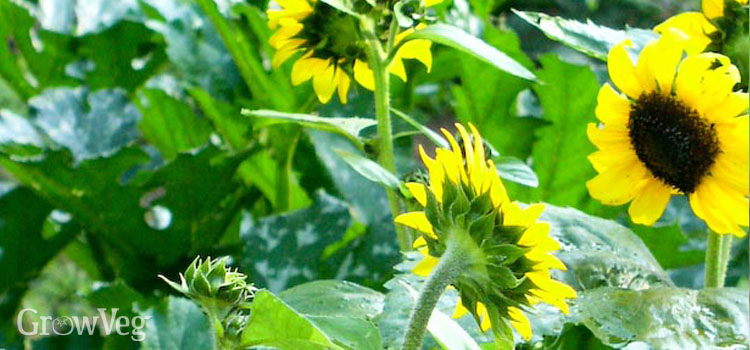Summer squash (Cucurbita pepo) is fast and easy to grow in warm summer weather, and the plants are often phenomenally productive. Courgettes, yellow squash, Middle Eastern types and scallop squash are all summer squash. In my garden, I may grow three or four varieties, though I grow no more than six summer squash plants, total. The big, burly plants take up quite a bit of space in the garden, which you don't want to waste by growing more than you will actually eat. And then there is the more serious risk of boring the household cook to the point where he or she puts their foot down and says they have simply had enough. In a good year, summer squash burnout becomes an imminent risk in most gardening households.
Courgette or Zucchini?
This blog is an international conversation on vegetable gardening, so first we should clear up some language issues. All of the following types are summer squash, in that they are classified as Cucurbita pepo and are typically harvested when young and tender:
- Courgette, which is synonymous with zucchini, is the top choice for many gardeners. Depending on variety, courgettes are straight or club-shaped, or they can be round or shaped like teardrops. Green coloured fruits are most common, but golden yellow courgettes are increasingly popular.
- Mid-Eastern types are sometimes called cousa squash, and the big, robust plants tend to be phenomenally productive. The light green bulbous fruits keep coming on gigantic plants, often out-producing other varieties.
- Yellow squash have thin, tender skins, and while they are much beloved in many parts of the US, they are not tremendously popular in Europe.
- Scallop squash look like puffed-up saucers with rounded edges, and they were quite popular among North America's First Nation tribes. The firm flesh holds up to cooking a little better than other summer squash, and varieties like yellow-and-green ‘Sunburst' (an All-America Selections award winner from 1985), provide great colour contrast on the plate.
![Courgette]() Courgette
Courgette
Different types of summer squash readily share pollen, so unless you plan to save seeds, you can grow one plant of each type – or another mix that matches your preferences – and get good pollination and fruit set. If you do plan to save seeds, grow pairs of like plants at opposite ends of the garden to limit cross-pollination. Be sure to begin with a good open pollinated variety.
Understanding Squash Sex
Usually we don't bring up pollination when discussing vegetable crops, but squash and other members of the cucumber family flaunt their sexual needs to their keepers, who may need to lend assistance in small plantings of fewer than four plants.
In typical cucurbit style, summer squash blossoms may be either male or female. The male flower has a bare stem, while the base "stem" of the female flower is an actual squash. Most young squash plants produce all male flowers at first, followed by a mix of males and females a week or so later. If you are growing only a few plants, you can enhance pollination by taking a male flower and "kissing" it to open female flowers, preferably first thing in the morning.
If you have more than three plants, your summer squash will probably be fertilised nicely by assorted flying insects. I have found that sunflowers make good companion plants for summer squash because they grow up through the thick squash foliage, and attract honeybees and other pollinators at just the right time.
 Sunflowers make good companions for summer squash because they help attract pollinators
Sunflowers make good companions for summer squash because they help attract pollinators
The best summer squash in the world are the ones you grow in your garden, harvest at the peak of tenderness and flavour, and then enjoy for the rest of the year. At our house, six or seven plants produce enough summer squash to eat fresh and stash in the freezer, often in combination with chopped basil and other odds and ends from the summer garden. In the garden and in the freezer, mixing things up is key to finding happiness in summer squash.
By Barbara Pleasant